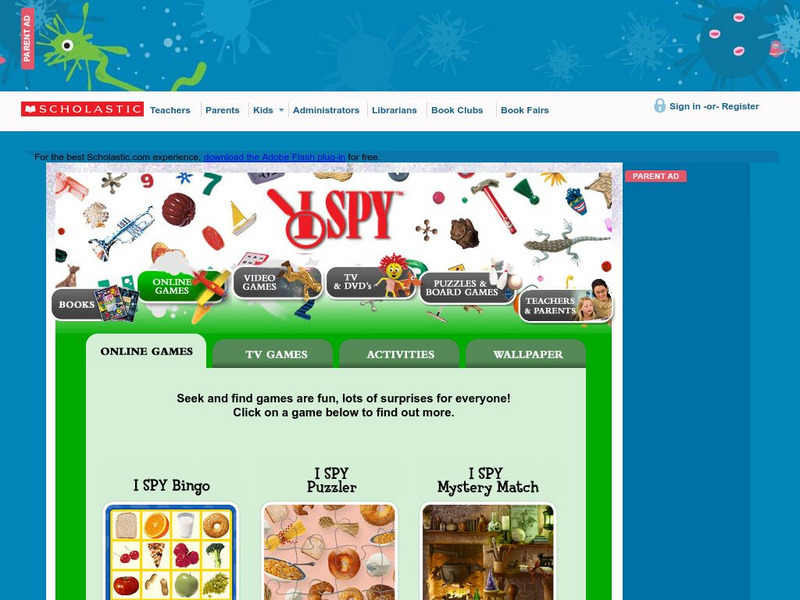K20 LEARN
Taking a Bite! Exploring Cultural Identity Through Food
High schoolers are asked to consider the connections between food, culture, and identity. They read articles and share what they learned in a jigsaw activity, read a short story, and make a claim about the story's theme, backing up their...
Curated OER
4-H Nutrition/Health/Fitness- Intermediate Leader's Page
Have some fun with healthy living in 4-H! Through several activities, young members learn about healthy eating, basic first aid, and fun exercise options. Of course, service ideas are outlined to extend learning. Students use websites to...
Curated OER
Looks Good Enough to Eat
Learners examine food photography and the different techniques used by food stylists to make foods look appealing in advertisements. After learning some of the tricks of the trade, students plan and shoot their own food advertisements.
Curated OER
Smart Snacking Ideas
Educate parents on obesity prevention using these discussion points, specifically geared toward families of preschoolers. You will need to add to this, as it is mostly an outline of topics and objectives. Concepts include healthy...
Chicago Botanic Garden
Climate Change Impacts on Ecosystem Services
The fourth activity in a series of five has classes participate in a jigsaw to learn about global impacts of climate change and then share their new information with a home group. Groups then research impacts of climate change (droughts,...
American Museum of Natural History
Piecing It All Together
Archaeology digs are much like giant jigsaw puzzles. The artifacts found are often in pieces and scientists must reconstruct them. A hands-on activity lets young archaeologists experience this facet of the job as they create, smash, and...
Nemours KidsHealth
Media Literacy and Health: Grades 9-12
An essential skill for 21st-century learners is to know how to find reliable sources of information. Two activities help high schoolers learn how to determine the reliability of health-related news from websites, TV, magazines, or...
Chicago Botanic Garden
Impacts of Climate Change
Scholars become experts on the eight major impacts of climate change through a jigsaw and grand conversation. They then research and present what they learned about effects specific to their region.
Curated OER
The Jigsaw Strategy: Students Put Pieces of Reading Together
Students demonstrate the jigsaw strategy by individually reading different selections of a text, and then coming together to share what they have learned.
Curated OER
Benefits of Nutrients
Explore the nutrients a body needs using this resource. Learners discuss the importance of the relationships between proteins, fats, carbohydrates, vitamins, minerals, and water. It's a great way to have your class talk about the healthy...
Virginia Department of Education
The Cycles of Nature
Encourage peer collaboration and assist with the creation of visual aids to identify carbon, water, and nitrogen cycles as your class learns more about nature. They discuss relative information, create a visual aid...
Curated OER
Comparison of American Colonies
Learners explore the lifestyles of the American colonies. They conduct various activities according to their grade level including jigsaw research and creating a poster. Lesson includes primary source readings related to the topic.
Curated OER
Animal Life Cycles
Students participate in numerous activities to gather information about parts of the life cycle. In this life science lesson, the teacher choose from a number of activities to create or support an interdisciplinary unit about the life...
Curated OER
Vegetarianism As a Growing Trend in the Uk
Students examine the growing trend of vegetarianism in the UK. They participate in a jigsaw reading activity, conduct a role-play discussing the issues of vegetarianism, take a quiz about fruit and vegetables, and complete a food chart...
Curated OER
American Indians and Their Environment
Students create a storyboard of the three American Indian language groups showing the geography of where they lived and how they adapted to the environment. They compare European and American Indian views of nature and explain how these...
Curated OER
Animal Life Cycle
Students conduct hands-on experiments. In this life cycle lesson, students are able to observe a variety of animals as they travel through their life cycle (brine shrimp, mealworms, frog eggs and chicken eggs). Students respond to what...
Curated OER
Build a U.S. Strategy for Responding to the Crisis in Sudan
Students work together in groups to discover the situation in Sudan. They discuss what problems arise from helping a foreign country. They answer questions and watch a video as well.
Curated OER
Dinosaurs - Physical Characteristics
Students describe the physical characteristics of dinosaurs, compare and contrast the evolution of land, and they explore the extinction of dinosaurs.
Curated OER
Types of Dinosaurs
Students complete puzzles of dinosaurs. They compare each piece of the puzzle to a fossil and simulate a scientist's role in learning about dinosaurs.
Curated OER
Mapping It Out
Fourth graders examine various aspects of the environment of Utah. In groups, they create four maps of Utah, based on temperature, precipitation and elevation. To end the instructional activity, they are asked a question as a group and...
Scholastic
Scholastic: I Spy: Bingo
I SPY activities consist of software, jigsaw puzzles, and games for children. Students use problem-solving skills when playing the visual bingo. The bingo game examines food and fruit while learners look for a match.




















